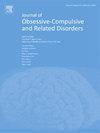Interpersonal transmission of ROCD symptoms and susceptibility to infidelity in romantic relationships
Abstract
Relationship obsessive–compulsive disorder (ROCD) is a disabling presentation of obsessive-compulsive disorder (OCD) centering on close interpersonal relationships. Previous studies focused on the personal consequences of ROCD symptoms. Yet, studies investigating the consequences of ROCD symptoms on one's partner are scarce. In this study, we assessed whether exposure to romantic partners' elevated ROCD symptoms would heighten participants' ROCD symptoms and would increase participants' evaluation of their own and their partners' susceptibility to infidelity. Heterosexual couples (Ncouples = 50; Mage = 25.8) completed self-report questionnaires. One randomly selected partner of each romantic dyad was then randomly allocated to being exposed to information suggesting their partner has low (low-exposure) or high (high-exposure) levels of ROCD symptoms. Results indicated that participants in the high-exposure group showed higher ROCD symptoms than participants in the low-exposure group. Exposure to allegedly elevated levels of partners' ROCD symptoms also led participants to evaluate their own and their partners' susceptibility to infidelity as higher than participants in the low-exposure group, particularly among participants with pre-existing ROCD symptoms. These results illustrate a ‘contagious’ effect of unmediated exposure to partners' ROCD symptoms and its potentially unfavorable consequences. Clinical implications regarding partner involvement in the treatment of ROCD are discussed.

 求助内容:
求助内容: 应助结果提醒方式:
应助结果提醒方式:


